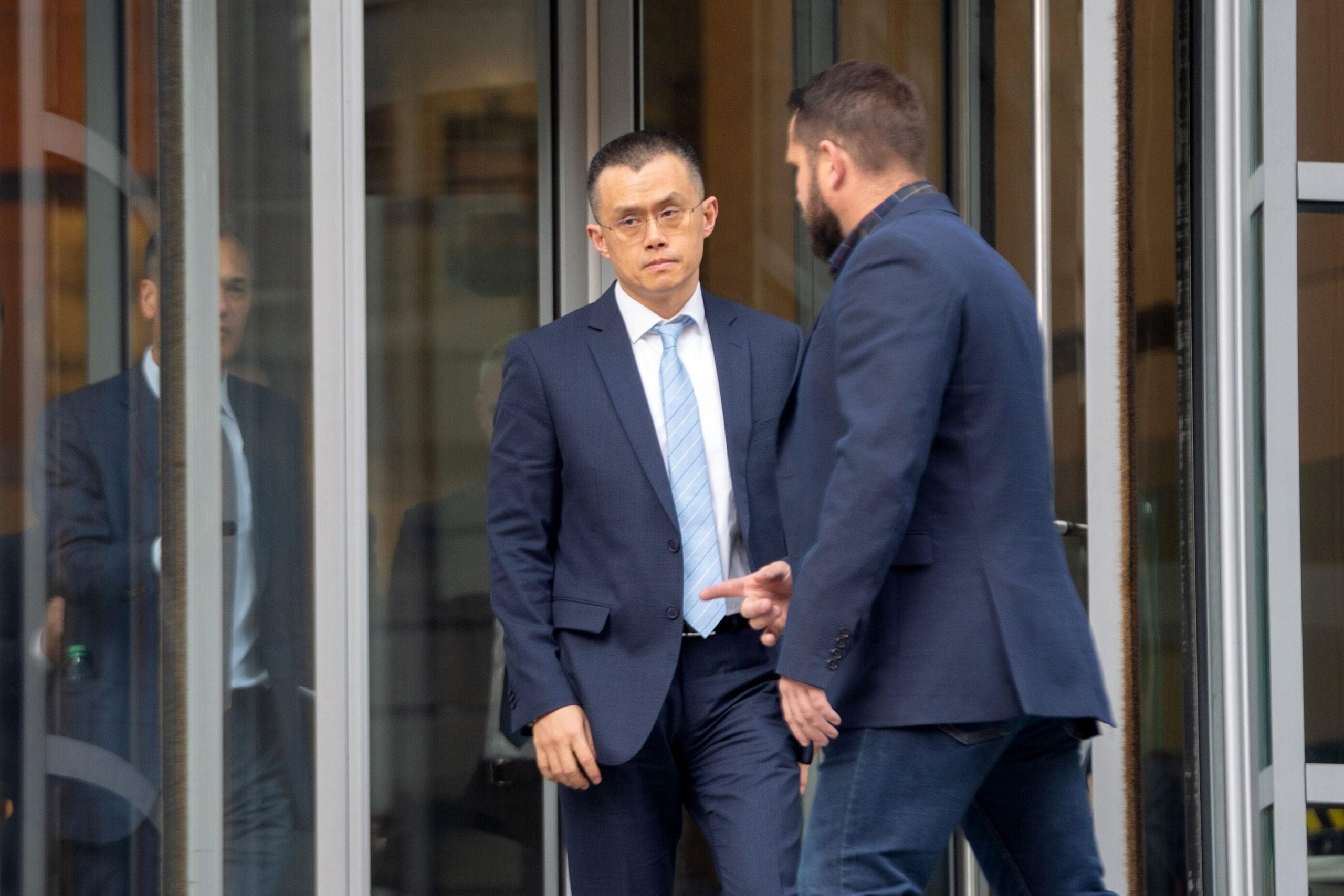By Chris Strohm, Matt Day, Allyson Versprille and Ava Benny-Morrison
Binance Holdings Ltd. and its Chief Executive Officer Changpeng Zhao pleaded guilty to anti-money laundering and US sanctions violations under a sweeping settlement with the US that allows the cryptocurrency exchange to continue operating.
Binance will pay $4.3 billion in one of the largest corporate agreements in US history. Zhao will pay a $50 million fine under a deal that requires him to step down as CEO. Zhao pleaded guilty Tuesday to violating the Bank Secrecy Act in federal court in Seattle. The deal, which includes the Justice Department, Treasury Department and the Commodity Futures Trading Commission, ends a years-long investigation into the exchange.
Binance, which admitted that it allowed transactions with Hamas and other terrorist groups on the platform, was charged with three counts, including anti-money laundering, operating an unlicensed money transmitting business and violating US sanctions. The exchange is paying a criminal fine of $1.8 billion and forfeiting $2.5 billion, according to court filings unsealed Tuesday.
Zhao faces as many as 10 years in prison but is expected to get no more than 18 months under a plea deal that appears to have saved him from the harsh penalties that other prominent crypto criminals have faced. The Justice Department hasn’t decided yet what length of a prison term they will seek for him.
Binance’s violations included failure to prevent and report suspicious transactions with terrorists, including Hamas’ Al-Qassam Brigades, Palestinian Islamic Jihad, Al Qaeda, and the Islamic State of Iraq and Syria, according to the Treasury Department. The announcement comes as Israel and Hamas have been embroiled in a war that began Oct. 7.
Binance also allowed at least 1.1 million transactions, worth more than $898 million, on its platform between customers in US and Iran, according to the court filing.
“Binance became the world’s largest cryptocurrency exchange in part because of the crimes it committed — now it’s paying one of the largest corporate penalties in U.S. history,” Attorney General Merrick Garland said in a press release.
Money from the fine will be split among DOJ, CFTC and other agencies. It includes $3.4 billion to the Treasury Department’s Financial Crimes Enforcement Network and $968 million to its Office of Foreign Assets Control over Bank Secrecy Act and sanctions violations.
New CEO
BNB, a cryptocurrency tied to the Binance ecosystem, slipped about 5.2% following the news. The token had hit a five-month high earlier in the day on the news that the DOJ would soon confirm its settlement with the exchange.
“Binance turned a blind eye to its legal obligations in the pursuit of profit,” Treasury Secretary Janet Yellen said in a press release. “Its willful failures allowed money to flow to terrorists, cybercriminals and child abusers through its platform.”
The settlement negotiated between the two sides will resolve all allegations of criminal wrongdoing. Bloomberg News reported the settlement on Monday. Garland and Yellen held a press conference Tuesday to announce details of the deal.
As part of his plea deal with the government, Zhao, who has a net worth of $23 billion according to Bloomberg’s Billionaires Index, has stepped down as Binance CEO and can’t be involved in managing the company for three years. Richard Teng will succeed Zhao as CEO.
The company has also agreed to enhance its compliance program and appoint an independent monitor for three years. Binance’s multibillion dollar fine reflects a 20% discount for “partial cooperation” with the investigation, the agreement states.
In a blog post Tuesday, the company acknowledged that it did not have proper compliance controls in its early launch, but said the settlement didn’t include any allegations that Binance misappropriated user funds or engaged in market manipulation.
VIP Customers
The Justice Department accused the company — as well as top executives, including Zhao — of taking steps to conceal that it was dodging US laws intended to stem the flow of dirty money around the world. The filing states that from about August 2017 until October 2022, Binance and Zhao were involved in a “deliberate and calculated effort” to profit from the US market without implementing controls required by law.
Binance “chose not to comply with US legal and regulatory requirements because it determined that doing so would limit its ability to attract and maintain US users,” according to the charging document.
Binance created loopholes that allowed US-based VIP customers to trade on the international exchange through offshore entities. The government’s case relied on internal documents, chats and details of phone calls to show how Binance helped VIP customers circumvent IP address blocking.
These strategies, the government claimed, allowed US-based VIP users to carry out virtual currency transactions “equivalent to billions of US dollars per day.” Acting on instruction from Zhao and other senior management, employees encouraged the VIPs to conceal their US connections, including by creating new accounts.
Zhao, according to the government’s court filings, discussed strategies to keep the market makers on Binance.com to reduce “our own losses” and to have “US supervision agencies not cause us any troubles.”
Zhao was well aware of the presence of US customers on the Binance.com exchange. In a chat in 2019, he wrote that if Binance blocked US customers from day one “Binance will not be as big as we are today.”
A year later, US users still made up 16% of total users on Binance, more than any other country. Binance removed the US label for user location and recategorized it as “UNKWN.”
Zhao wrote that it was “better to ask for forgiveness than permission” and described the situation as a “grey zone.”
CZ in Court
Zhao wore a dark suit and light blue tie, and spent most of the hearing seated with his hands clasped. Judge Brian Tsuchida ruled Zhao would be released and was free to return to his home in the United Arab Emirates while awaiting sentencing.
“I want to close the issue, I want to take responsibility and close this chapter of my life,” Zhao told the court during the hearing. Zhao said he was “a little bit scared” to come to the US to face his plea, but said he was reassured by the court’s thoroughness. “I will return.”
Zhao’s bond was set at $175 million, after his lawyers said he would be prepared to put up that amount to secure his release. Lawyers for the government, who had asked that Zhao be ordered to stay in the country because the US lacks an extradition treaty with the UAE, said they would appeal the release terms.
As part of the release, Zhao’s sister also put up a California home, which his lawyers said was valued at more than $5 million, and two unnamed guarantors committed a total of $350,000.
Zhao faces a maximum sentence of 10 years and fines up to $500,000, plus any profits he made from the alleged scheme. His lawyers said in court that his sentencing will be delayed by 6 months. Zhao’s agreement includes a waiver of his right to appeal, provided that his sentence doesn’t exceed 18 months, judge Tsuchida said during the plea hearing.
Crypto Crackdown
The resolution against the world’s largest cryptocurrency exchange and its top leader represents one of the largest penalties imposed within the cryptocurrency industry, which has been facing withering scrutiny from the Justice Department, other government agencies and lawmakers.
Binance, which exploded onto the crypto scene in 2017 and almost immediately took on and surpassed larger rivals, saw its market share surge to more than 60% worldwide after the fall of FTX in November 2022. Since then, its combined market share for spot crypto and derivatives has declined to less than 44% this month, according to researcher CCData.
The Justice Department recently prosecuted FTX co-founder Sam Bankman-Fried in New York for allegedly orchestrating a multibillion-dollar misappropriation of customer funds that led to the cryptocurrency exchange’s collapse. Bankman-Fried was convicted of fraud following a high-profile criminal trial.
Both the CFTC and Securities and Exchange Commission sued Binance and Zhao earlier this year alleging a range of violations, including mishandling customer funds and allowing Americans to illegally access the platform. Tuesday’s settlement resolves the CFTC case but the SEC lawsuit is ongoing.
Zhao worked at Bloomberg LP, the parent company of Bloomberg News, from 2002 to 2005.
Note:- (Not all news on the site expresses the point of view of the site, but we transmit this news automatically and translate it through programmatic technology on the site and not from a human editor. The content is auto-generated from a syndicated feed.))



